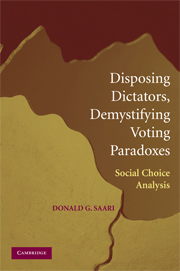Crossref Citations
This Book has been
cited by the following publications. This list is generated based on data provided by Crossref.
Komarova, Natalia L.
and
Jameson, Kimberly A.
2008.
Population heterogeneity and color stimulus heterogeneity in agent-based color categorization.
Journal of Theoretical Biology,
Vol. 253,
Issue. 4,
p.
680.
(Ivy) Li, Lingfang
and
Saari, Donald G.
2008.
Sen’s theorem: geometric proof, new interpretations.
Social Choice and Welfare,
Vol. 31,
Issue. 3,
p.
393.
Lauwers, Luc
2009.
The topological approach to the aggregation of preferences.
Social Choice and Welfare,
Vol. 33,
Issue. 3,
p.
449.
Miller, Michael K.
and
Osherson, Daniel
2009.
Methods for distance-based judgment aggregation.
Social Choice and Welfare,
Vol. 32,
Issue. 4,
p.
575.
Yang, Suhong
2009.
A Voting Statistical Method of Group Decision.
p.
873.
Hulkower, Neal D.
2009.
The Judgment of Paris According to Borda.
Journal of Wine Research,
Vol. 20,
Issue. 3,
p.
171.
Eckert, Daniel
and
Klamler, Christian
2009.
Algorithmic Decision Theory.
Vol. 5783,
Issue. ,
p.
14.
Suhong Yang
2009.
A Non-paradoxical Interpretation of the Voting Paradox.
p.
59.
Abate, Marco
2010.
Matematica e cultura 2010.
p.
197.
Saari, Donald G.
2010.
Collective Decision Making.
Vol. 43,
Issue. ,
p.
1.
Emerson, Peter
2010.
The Next Scottish Referendum.
Scottish Affairs,
Vol. 73 (First Serie,
Issue. 1,
p.
36.
Saari, Donald G.
2010.
Systematic analysis of multiple voting rules.
Social Choice and Welfare,
Vol. 34,
Issue. 2,
p.
217.
Salles, Maurice
and
Zhang, Feng
2010.
Collective Decision Making.
Vol. 43,
Issue. ,
p.
85.
Nurmi, Hannu
and
Saari, Donald G.
2010.
Collective Decision Making.
Vol. 43,
Issue. ,
p.
31.
Saari, Donald G.
2010.
Peter Emerson (ed): Designing an all-inclusive democracy.
Social Choice and Welfare,
Vol. 35,
Issue. 2,
p.
331.
Hulkower, Neal D.
2010.
The Probable Lowest-Cost Alternative According to Borda.
Journal of Cost Analysis and Parametrics,
Vol. 3,
Issue. 2,
p.
29.
Nitzan, Shmuel
2010.
Demystifying the ‘metric approach to social compromise with the unanimity criterion’.
Social Choice and Welfare,
Vol. 35,
Issue. 1,
p.
25.
Saari, Donald G.
2010.
Aggregation and Multilevel Design for Systems: Finding Guidelines.
Journal of Mechanical Design,
Vol. 132,
Issue. 8,
Emerson, Peter
2010.
PROPORTIONALITY WITHOUT TRANSFERENCE: THE MERITS OF THE QUOTA BORDA SYSTEM (QBS).
Representation,
Vol. 46,
Issue. 2,
p.
197.
Saari, Donald G.
2011.
Source of complexity in the social and managerial sciences: an extended Sen’s theorem.
Social Choice and Welfare,
Vol. 37,
Issue. 4,
p.
609.





